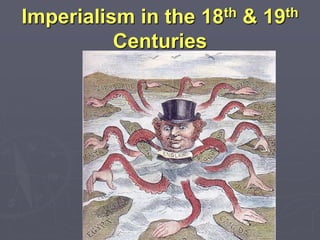
Imperialism 2014
- 1. Imperialism in the 18th & 19th Centuries
- 2. IMPERIALISM (1770s-1914) Industrialized nations (Europe, U.S., Russia, and later Japan) strengthened their control over their colonies AND established transoceanic empires throughout Asia, the Pacific, and Africa. Imperialism is this extension of political and economic control of stronger nations over weaker nations
- 3. European Colonies - 1700
- 7. WHY did industrialized nations seek to control other areas of the world in the 18th and 19th centuries?
- 9. To control the trade of valuable products around the world- industrialization and growing affluence led to the need for extensive raw materials and agricultural products
- 10. markets for their factory products-sometimes European factories produced more than Europeans could consume for themselves
- 11. Absorb the excess population of European nations-avoid class conflict at home Nationalism- “Great Power” status in a competitive political system (Italy and Germany)
- 12. ABCs for Baby Patriots-1899
- 13. Missionaries, aid societies, and others wanted to “Christianize” and/or “civilize” people in less developed regions. •By 1910, 10,000 missionaries in Africa •By the 1960s, 50 million Africans were Christian
- 15. HOW did they do it? Industrialized nations: Used their stronger militaries (using superior firepower, military technology, & navies) Relied on native elites who were Western educated
- 17. •Steam ships and British control of Suez Canal •Underwater telegraph cables
- 18. Industrialized nations: Used their wealth for influence Had support by industrialists, military, and religious groups
- 19. Industrialized nations had: Medicines and medical technology- Quinine to prevent malaria
- 20. JUSTIFICATION for Imperialism Widespread belief among imperial powers that European races SHOULD dominate the world. SOCIAL DARWINISM – survival of the world’s best races
- 21. Social Darwinism •Based on the ideas of Charles Darwin and the “survival of the fittest.” •European dominance involved the destruction or displacement of “backward” people or “unfit” races. •Imperial aggression was seen as both natural and progressive.
- 24. The British Empire 19th century
- 26. The partition of Africa 1800s
- 27. Scramble for Africa By 1914, 90% of Africa under European control Berlin Conference in 1885 sets ground rules for European colonization of Africa Hardest to conquer decentralized societies w/ no formal state structure- village by village
- 28. The partition of Africa 1914
- 29. • See if you can identify part of the problem with colonization.
- 30. Scramble for Africa Consequences Traditional way of life disrupted Economic exploitation of Africans European racism imported into Africa Spread of European culture-education and religion Spread of Western technology Change to women’s roles
- 31. Scramble for Africa Economic Consequences-Rise in forced labor within Africa Forced Labor-Belgian Congo most infamous case of abuse Cash-Crop agriculture-often led to famine for local people and dependence on foreign markets Wage Labor-migration of labor, urbanization, mines
- 32. ECONOMIES of FORCED LABOR Colonial subjects were required / forced to work as unpaid laborers on public projects like building railroads, constructing government buildings, and transporting goods. French Africa – 10-12 days labor per year Belgian Congo – private companies with state support terrorized natives to collect rubber Netherlands East Indies – peasants required to turn 20% of their land into cash crop agriculture Portuguese Mozambique – brutal enforcement of cotton production quotas
- 34. British control of India-British East India Company
- 35. Indian Rebellion1857-58 •Based on a series of Indian grievances towards the British •Led to intolerance of natives and direct control by the British government
- 36. Britain (United Kingdom) Includes England, Scotland, Wales, Ireland Largest colonial empire “Sun never sets on the British Empire” Colonies established to protect trading interests in Africa and Asia Two kinds of colonies “White” Colonies (Canada, Australia, New Zealand, South Africa) Populated mainly by people that moved there from Britain Given self-rule “Non-white” Colonies (India, Africa) Under indirect rule Populated mainly by people who are native to the area Few people from Britain actually live there – but control the government
- 37. What is being advertised? Where is this taking place? How can you tell? What is going on? What does it tell us about imperialism / colonialism? Who was the queen at the time? Common advertisement during Imperialism
- 38. A British Merchant's Home in Colonial India
- 39. European Imperialism in India Consequences of British Imperialism in India British educational system established-creates cultural divide between educated and uneducated Spread of English language Railroads tie India together Rise of Indian middle class-Western educated and eventually politically active